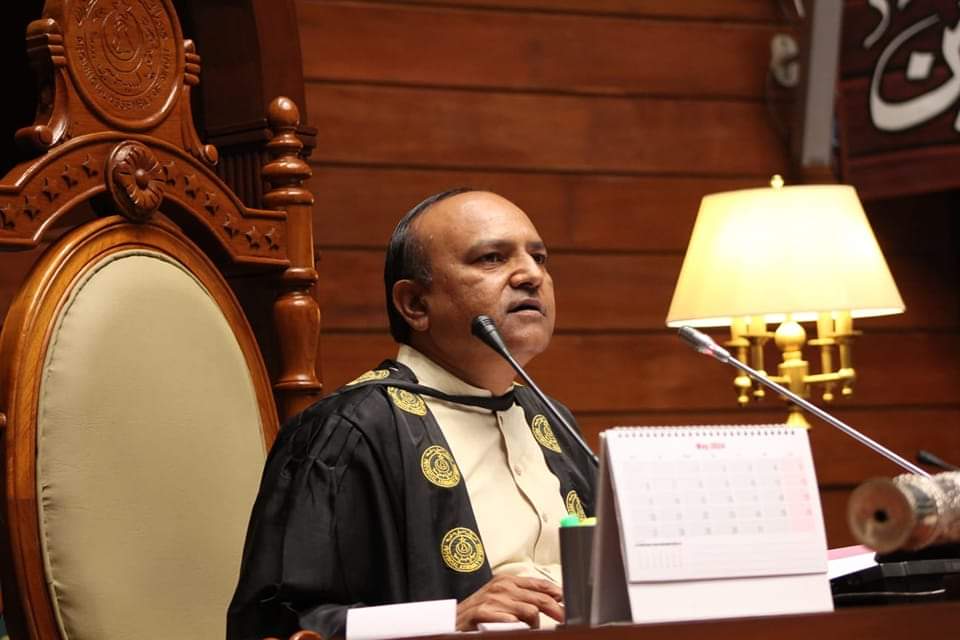The White Post Special
Q. Mr. Anthony Naveed, can you share with us the early days of your political activism journey and the challenges you faced?
At the very beginning of my political journey, there were numerous problems in our community. The biggest issue we faced was the lack of education. Despite the many deprivations and challenges, we realized that education was key to overcoming these obstacles. Together with some college friends, we formed the Christian Student Association. There was a purity in our intent; we genuinely wanted to do something for our community. We started small, offering free coaching classes, working on self-awareness, and self-assessment to uplift my community.

Q. How did your association with the Pakistan People’s Party (PPP) begin?
My political career began with the People’s Party and it remains my party to this day. I started my journey with the Pakistan People’s Party in the early 80s. The PPP has always felt like a part of me.

Q. Can you tell us about your first election and subsequent political career?
In 2005, I contested an election from the Union Council. In 2016, I was appointed as Special Assistant to the Chief Minister by the PPP. In 2018, I was elected as a member of the Sindh Assembly. Recently, in 2024, the PPP made me a member of the Assembly again. Notably, during the 2008 elections, Martyr Ms. Benazir Bhutto herself gave me an MPA ticket. Although I couldn’t contest due to technical reasons, it was significant as it was rare for a non-Muslim to get a ticket then on a general seat.

Q. As you just mentioned, your party has been known for its inclusivity. How has it supported minorities and other marginalized groups?
The Pakistan People’s Party has always been a legal voice for minorities. It has a unique history of empowering women compared to other political parties. In Sindh, for instance, the PPP has ensured political representation for transgender individuals in local bodies through reserved seats.
Additionally, there are guaranteed seats for disabled persons in municipalities. PPP’s commitment to an inclusive society goes beyond words; it’s about practical actions.

Q. What are the initiatives your party PPP has taken to support non-Muslims?
The PPP introduced a five percent job quota to improve the economic life of non-Muslims. To ensure political representation of religious minorities, quota of special seats is also allocated. Which has helped in overcoming the sense of deprivation among non-Muslims regarding becoming members of the Provincial and National Assemblies.
The PPP ensured their representation, and Bilawal Bhutto’s vision includes seeing a non-Muslim as Prime Minister someday. While many might see it as just a statement, but giving a constitutional seat to a non-Muslim can be seen as a significant step.

Q. Can you tell us a bit about your personal life?
My mother passed away in 2013, but thankfully, my father is still alive and healthy. I have four children—two sons and two daughters. I did my formal schooling from St. Patrick’s School Karachi and I also have a diploma in Garment Technologies. I was born in 1971 in Karachi, and my ancestors belonged to Sialkot. We are four siblings in the family.

Q. Finally, what message would you like to convey to political workers, both Muslim and non-Muslim?
My request to all political workers is to choose parties that respect their members. The Pakistan People’s Party has always respected every class, whether they are transgenders, non-Muslims, or women. They have treated everyone equally, and this respect is crucial for any political party.




Dear brother May God always bring you success. We pray that you have that inner Ada in your life. Ameen.
Brother Anthony is the proud of our community I am very like to be his student in early ages. May almighty God bless him more and keep serving the community.
Anthoney Naveed is an example before our young generation to set their goals and determine to walk toward their successful achievement .May almighty God bless you more than before to Anthony Naveed.